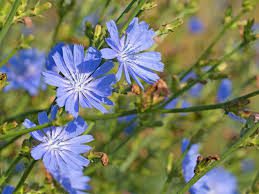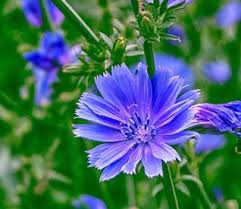Chicory is a plant that people have known about for a long time. It’s not just any plant; it has some interesting things going on. Firstly, chicory is a leafy green plant that often gets attention for its pretty blue flowers. These flowers are not just there to look good; they also have a purpose. Bees love them, and when bees visit, they help in the process of pollination.
Now, when we talk about eating chicory, it’s not just about the flowers. The leaves of the chicory plant are also quite popular. People often use them in salads, adding a bit of bitterness that some find really enjoyable. It’s like a flavor adventure in your salad bowl.
But wait, there’s more to chicory than just leaves and flowers. Some people take the roots of the chicory plant and do interesting things with them. They roast them, grind them, and turn them into a coffee substitute. Yes, you heard it right – chicory coffee. It’s not like regular coffee; it has its own unique taste. Some folks even mix it with their regular coffee to create a blend that’s both interesting and a bit different.
Now, why would someone bother with chicory coffee? Well, chicory has been around for a long time, and in the past, people used it as a coffee substitute when coffee was in short supply. They discovered that chicory could add a rich and earthy flavor to their drink. Even today, some people choose chicory coffee for its unique taste and potential health benefits.
Speaking of health benefits, chicory has some interesting stuff going on there too. It’s known to be a good source of certain vitamins and minerals. Some folks believe that it can be good for digestion, acting like a friend to your tummy.
In addition, chicory is not just a plant; it’s a versatile one. From its vibrant blue flowers to its bitter leaves and roasted roots, chicory has found its way into various aspects of our lives. Whether you enjoy it in a salad, as a coffee substitute, or simply appreciate its role in nature’s grand plan, chicory is a plant worth knowing about.
Read Also: Black Cat Breeds Description and Complete Care Guide
Uses of Chicory

Chicory finds its way into various uses, making it a versatile plant with different applications.
1. Culinary Delights:
Leaves in Salads: The bitter leaves of chicory add a distinctive flavor to salads, contributing a hint of bitterness that some people appreciate.
Cooked Greens: Some cuisines include cooked chicory greens in various dishes, enhancing the nutritional content of meals.
2. Coffee Substitute:
Roasted Roots: The roots of the chicory plant can be roasted and ground to create a coffee substitute. Chicory coffee has a unique, earthy flavor and has historically been used as an alternative when coffee was scarce.
3. Traditional Medicine:
Digestive Aid: Chicory is believed by some to have digestive benefits. It’s thought to promote healthy digestion and may act as a natural aid for the stomach.
4. Bee-friendly Plant:
Pollinator Support: The bright blue flowers of chicory attract bees, playing a role in the pollination process. This makes chicory a friend to both nature and beekeepers.
5. Landscaping and Ornamental Purposes:
Decorative Gardens: The aesthetically pleasing blue flowers make chicory a choice for decorative gardens. Its vibrant blooms add color and charm to outdoor spaces.
6. Livestock Forage:
Animal Feed: In some agricultural settings, chicory is used as forage for livestock. Its nutritional value makes it a suitable addition to the diet of certain animals.
7. Erosion Control:
Soil Stabilization: The deep taproot of the chicory plant helps prevent soil erosion. This makes it valuable in areas where soil stability is a concern.
8. Environmental Remediation:
Phytoremediation: Chicory has been explored for its ability to absorb and accumulate heavy metals from the soil, potentially aiding in environmental cleanup efforts.
In essence, chicory is not just a leafy green but a plant with a spectrum of uses, ranging from culinary applications to environmental contributions. Whether gracing your salad bowl, brewing into a coffee alternative, or playing a role in nature’s balance, chicory has found its place in various aspects of human life and the environment.
Read Also: Abyssinian Cat (Felis catus) Description and Complete Care Guide
Importance of Chicory

The importance of chicory spans various domains, ranging from culinary and agricultural to environmental and potential health benefits.
1. Culinary Significance:
Flavor Diversity: Chicory adds a distinct and slightly bitter flavor to culinary creations, contributing to the diversity of tastes in salads and cooked dishes.
2. Coffee Substitute:
Historical Alternative: Chicory has served as a coffee substitute during times of scarcity, showcasing its historical importance as a beverage alternative.
3. Nutritional Value:
Vitamins and Minerals: Chicory is a source of vitamins and minerals, including vitamin C, vitamin K, and potassium, adding nutritional value to diets.
4. Digestive Health:
Potential Digestive Aid: Some people believe that chicory may have digestive benefits, acting as a natural aid for digestion and stomach health.
5. Pollinator Support:
Bee Attraction: The vibrant blue flowers attract bees, contributing to pollination processes and supporting the health of bee populations.
6. Livestock Forage:
Animal Nutrition: Chicory’s use as forage for livestock enhances the nutritional content of their diet, contributing to the health and well-being of animals.
7. Soil Stabilization:
Erosion Prevention: The deep taproot of chicory helps prevent soil erosion, making it valuable in areas where soil stability is a concern.
8. Environmental Applications:
Phytoremediation Potential: Chicory’s ability to absorb and accumulate heavy metals from the soil suggests its potential use in environmental remediation efforts.
9. Landscaping and Ornamental Value:
Aesthetic Appeal: Chicory’s vibrant flowers make it a choice for decorative gardens, contributing to the visual appeal of outdoor spaces.
10. Cultural and Historical Significance:
Traditional Uses: Chicory’s historical use in various cultures and its adaptation as a substitute in times of need contribute to its cultural importance.
In summary, chicory plays a multifaceted role in our lives, providing not only culinary delights and potential health benefits but also contributing to agriculture, environmental sustainability, and cultural practices. Its versatility and adaptability make chicory a plant of significance in various aspects of human and environmental well-being.
Read Also: 19 Foods to Lower your Blood pressure

